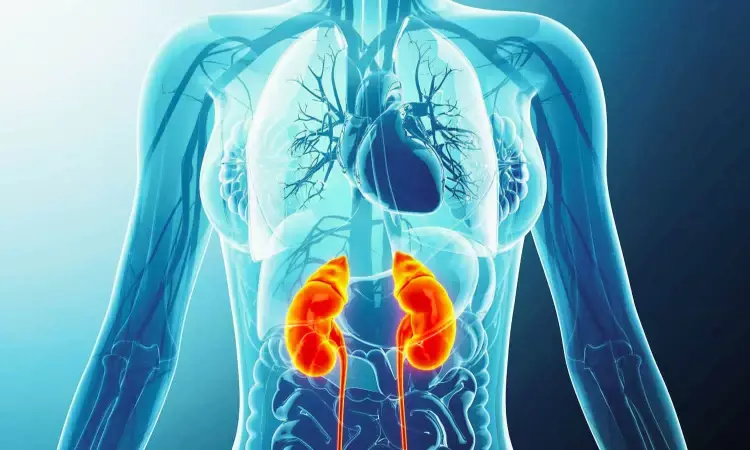- Home
- Medical news & Guidelines
- Anesthesiology
- Cardiology and CTVS
- Critical Care
- Dentistry
- Dermatology
- Diabetes and Endocrinology
- ENT
- Gastroenterology
- Medicine
- Nephrology
- Neurology
- Obstretics-Gynaecology
- Oncology
- Ophthalmology
- Orthopaedics
- Pediatrics-Neonatology
- Psychiatry
- Pulmonology
- Radiology
- Surgery
- Urology
- Laboratory Medicine
- Diet
- Nursing
- Paramedical
- Physiotherapy
- Health news
- Fact Check
- Bone Health Fact Check
- Brain Health Fact Check
- Cancer Related Fact Check
- Child Care Fact Check
- Dental and oral health fact check
- Diabetes and metabolic health fact check
- Diet and Nutrition Fact Check
- Eye and ENT Care Fact Check
- Fitness fact check
- Gut health fact check
- Heart health fact check
- Kidney health fact check
- Medical education fact check
- Men's health fact check
- Respiratory fact check
- Skin and hair care fact check
- Vaccine and Immunization fact check
- Women's health fact check
- AYUSH
- State News
- Andaman and Nicobar Islands
- Andhra Pradesh
- Arunachal Pradesh
- Assam
- Bihar
- Chandigarh
- Chattisgarh
- Dadra and Nagar Haveli
- Daman and Diu
- Delhi
- Goa
- Gujarat
- Haryana
- Himachal Pradesh
- Jammu & Kashmir
- Jharkhand
- Karnataka
- Kerala
- Ladakh
- Lakshadweep
- Madhya Pradesh
- Maharashtra
- Manipur
- Meghalaya
- Mizoram
- Nagaland
- Odisha
- Puducherry
- Punjab
- Rajasthan
- Sikkim
- Tamil Nadu
- Telangana
- Tripura
- Uttar Pradesh
- Uttrakhand
- West Bengal
- Medical Education
- Industry
Oxypurinol may reduce oxidative stress, inflammation and apoptosis and prevent acute kidney injury: Study

South Korea: A recent study published in Frontiers in Medicine has shown oxypurinol to be protective against renal ischemia/reperfusion (I/R) injury by reducing inflammation, oxidative stress, and apoptosis via HO-1 induction. The findings suggest its potential in preventing ischemic acute kidney injury (AKI).
Renal ischemia/reperfusion injury is defined as the restriction of blood supply to the kidney (ischemia) followed by blood flow restoration and reoxygenation (reperfusion). It is a major cause of acute kidney injury by increasing inflammatory responses, oxidative stress, and tubular cell death. Oxypurinol, an active metabolite of allopurinol, is a potent antioxidant and anti-inflammatory agent.
Hye Bin Kang, Pukyong National University, Busan, Republic of Korea, and colleagues aimed to investigate the therapeutic potential and underlying mechanism of oxypurinol in ischemic AKI, C57BL/6 male mice were intraperitoneally injected with oxypurinol and subjected to renal I/R or sham surgery.
The researchers revealed the following findings:
- Oxypurinol-treated mice had lower levels of plasma creatinine and blood urea nitrogen and tubular damage (hematoxylin-and-eosin staining) compared to vehicle-treated mice after renal I/R injury.
- Oxypurinol treatment reduced oxidative stress (i.e., 4-HNE, heme oxygenase-1 [HO-1], 8-OHdG expression, and Catalase mRNA induction), kidney inflammation (i.e., neutrophil infiltration and MIP-2 mRNA induction), and apoptosis (i.e., TUNEL or cleaved caspase-3-positive renal tubular cells), compared to vehicle-treated mice.
- Mechanistically, oxypurinol-induced protein expressions of HO-1, which is a critical cytoprotective enzyme during ischemic AKI, and oxypurinol-mediated protection against ischemic AKI was eliminated by pretreatment with tin protoporphyrin IX, an HO-1 inhibitor.
"Our renal I/R model is a leading cause of perioperative acute kidney injury in various clinical settings such as vascular, hepatic and cardiac surgeries, and kidney transplantation," the researchers wrote. "So, it is possible to adapt kidney to renal ischemia/reperfusion injury before those clinical surgeries by preconditioning such as remote organ ischemia, short ischemia, and treatment of pharmacological drug including HO-1 activators."
"Therefore, the findings suggest that oxypurinol-mediated preconditioning via HO-1 induction protects ischemic AKI rather than recovers from ischemic AKI by attenuating apoptosis, necrosis, inflammation, and oxidative damage after I/R, indicating that oxypurinol and its underlying mechanism may be a potential drug for preventing ischemic AKI," they concluded.
Reference:
Kang, H. B., Lim, C. K., Kim, J., & Han, S. J. (2023). Oxypurinol protects renal ischemia/reperfusion injury via heme oxygenase-1 induction. Frontiers in Medicine, 10, 1030577. https://doi.org/10.3389/fmed.2023.1030577
Dr Kamal Kant Kohli-MBBS, DTCD- a chest specialist with more than 30 years of practice and a flair for writing clinical articles, Dr Kamal Kant Kohli joined Medical Dialogues as a Chief Editor of Medical News. Besides writing articles, as an editor, he proofreads and verifies all the medical content published on Medical Dialogues including those coming from journals, studies,medical conferences,guidelines etc. Email: drkohli@medicaldialogues.in. Contact no. 011-43720751


